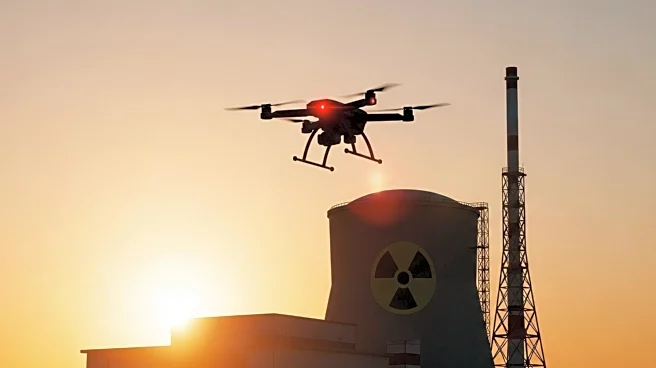What's Happening?
Russian officials have reported that Ukrainian drones attacked a nuclear power plant in the Kursk region, causing a fire that was quickly extinguished. The attack damaged a transformer, but radiation levels remained within normal ranges, according to the plant's press service. Additionally, Ukrainian strikes targeted several power and energy facilities in Russia, including an industrial enterprise in Syzran City, leading to an explosion and fire. The Russian Defense Ministry claimed its air defenses intercepted 95 Ukrainian drones over Russian territory overnight. The incidents coincide with Ukraine's Independence Day celebrations, marking 34 years since its independence from the Soviet Union.
Why It's Important?
The drone attacks on Russian infrastructure, particularly a nuclear power plant, highlight the ongoing tensions and military engagements between Russia and Ukraine. The potential risk of nuclear incidents raises concerns about regional safety and the broader implications for international security. The attacks also underscore the strategic importance of energy facilities in the conflict, affecting both nations' energy security and economic stability. The situation may influence diplomatic efforts and international relations, as stakeholders seek to mitigate risks and resolve the conflict.
What's Next?
The ongoing conflict suggests continued military engagements and potential retaliatory actions from Russia. Diplomatic efforts may intensify, with international stakeholders possibly increasing pressure for negotiations to prevent further escalation. The United Nations and other international bodies may become more involved in monitoring and addressing the safety of nuclear facilities in conflict zones. The situation could lead to increased military aid and support for Ukraine from allied nations, as seen with recent pledges from Canada and Norway.
Beyond the Headlines
The attacks on energy infrastructure may have long-term implications for regional energy security and economic stability. The conflict's impact on global energy markets could lead to shifts in energy policies and increased investment in alternative energy sources. The situation also raises ethical concerns about the targeting of critical infrastructure in warfare, prompting discussions on international humanitarian law and the protection of civilian facilities.











